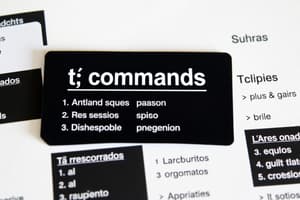Podcast
Questions and Answers
With whom do you use informal commands?
With whom do you use informal commands?
People whom you address using tú
What are the steps for affirmative informal commands?
What are the steps for affirmative informal commands?
Simply conjugate the verb for the third person singular present indicative
What is the affirmative informal command for 'hablar'?
What is the affirmative informal command for 'hablar'?
Habla
What is the affirmative informal command for 'guardar'?
What is the affirmative informal command for 'guardar'?
What is the affirmative informal command for 'volver'?
What is the affirmative informal command for 'volver'?
What is the affirmative informal command for 'pedir'?
What is the affirmative informal command for 'pedir'?
What is the affirmative informal command for 'decir'?
What is the affirmative informal command for 'decir'?
What is the affirmative informal command for 'hacer'?
What is the affirmative informal command for 'hacer'?
What is the affirmative informal command for 'ir/ver'?
What is the affirmative informal command for 'ir/ver'?
What is the affirmative informal command for 'poner'?
What is the affirmative informal command for 'poner'?
What is the affirmative informal command for 'salir'?
What is the affirmative informal command for 'salir'?
What is the affirmative informal command for 'tener'?
What is the affirmative informal command for 'tener'?
What is the affirmative informal command for 'venir'?
What is the affirmative informal command for 'venir'?
What is the affirmative informal command for 'ser'?
What is the affirmative informal command for 'ser'?
Where are pronouns placed in affirmative informal commands?
Where are pronouns placed in affirmative informal commands?
Where are pronouns placed in negative informal commands?
Where are pronouns placed in negative informal commands?
What are the steps for negative informal commands?
What are the steps for negative informal commands?
What is the negative informal command for 'hablar'?
What is the negative informal command for 'hablar'?
What is the negative informal command for 'guardar'?
What is the negative informal command for 'guardar'?
What is the negative informal command for 'volver'?
What is the negative informal command for 'volver'?
What is the negative informal command for 'pedir'?
What is the negative informal command for 'pedir'?
What is the negative informal command for 'tener'?
What is the negative informal command for 'tener'?
When is a spelling change necessary for an informal command?
When is a spelling change necessary for an informal command?
What is the negative informal command for 'dar'?
What is the negative informal command for 'dar'?
What is the negative informal command for 'estar'?
What is the negative informal command for 'estar'?
What is the negative informal command for 'ir'?
What is the negative informal command for 'ir'?
What is the negative informal command for 'saber'?
What is the negative informal command for 'saber'?
What is the negative informal command for 'ser'?
What is the negative informal command for 'ser'?
Practice Online (1)
Practice Online (1)
Practice Online (2)
Practice Online (2)
Flashcards are hidden until you start studying
Study Notes
Informal Commands Overview
- Used with individuals addressed as "tú".
- Divided into affirmative and negative commands, each with distinct formation rules.
Affirmative Informal Commands
- Formed by conjugating the verb in the third person singular present indicative.
- Examples:
- Hablar → Habla
- Guardar → Guarda
- Volver → Vuelve
- Pedir → Pide
- Decir → Di (irregular)
- Hacer → Haz (irregular)
- Ir/Ver → Ve
- Poner → Pon
- Salir → Sal (irregular)
- Tener → Ten (irregular)
- Venir → Ven (irregular)
- Ser → Sé (irregular)
- Pronouns are attached to the end of the command, requiring accents if the resulting word exceeds three syllables (e.g., escríbeles).
Negative Informal Commands
- Formed by combining "no" plus the pronoun plus the command.
- Formation Steps:
- Start with the present indicative yo form.
- Remove the -o ending.
- Add the opposite ending: -ar to -es; -er/ir to -as.
- Examples:
- Hablar → No hables
- Guardar → No guardes
- Volver → No vuelvas
- Pedir → No pidas
- Tener → No tengas
- Ir → No vayas (irregular)
- Ser → No seas (irregular)
- Saber → No sepas (irregular)
- Estar → No estés (irregular)
- Dar → No des (irregular)
Spelling Changes in Negative Commands
- Necessary for verbs ending in certain patterns:
- -car, c → qu
- -gar, g → gu
- -zar, z → c
Online Practice Resources
- Practice affirmative informal commands: SpanishDict Affirmative Commands Quiz
- Practice negative informal commands: SpanishDict Negative Commands Quiz
Studying That Suits You
Use AI to generate personalized quizzes and flashcards to suit your learning preferences.




